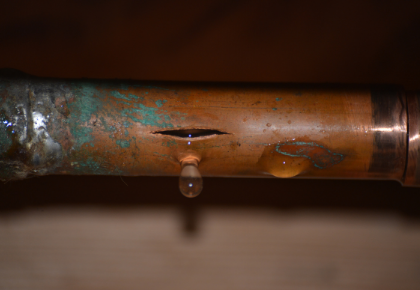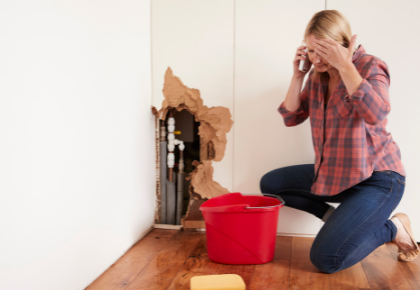Preventing the effects of cold weather on your pipes
The type of winter you experience in BC wholly depends on the area you live in. While Vancouver typically encounters milder winters, they still have around 41 days a year where the minimum temperature is at or below freezing. It’s these colder days that can create a number of expensive problems indoors. In these temperatures, one of the biggest concerns in a high-rise is the potential for frozen pipes.
Frozen water lines can burst, causing significant property damage
 If your building is heated by water that circulates through baseboard pipes, it’s critical that these water lines don’t freeze during one of the colder days Vancouver may experience in the winter.
If your building is heated by water that circulates through baseboard pipes, it’s critical that these water lines don’t freeze during one of the colder days Vancouver may experience in the winter.
The thermostat controls the electric zone valves on the pipes to lower or raise the room temperature. If ice forms anywhere in the pipe, the water line pressure increases and can cause the valve to fail and release the water into the room.
It’s important to understand that the system has an unlimited water supply; meaning a tremendous amount of damage can result before the water is turned off. Unfortunately, it’s usually not just a single unit that is impacted. Suites adjacent and below are affected as the water can travel down several floors and leave a long trail of destruction.
The cost of frozen pipes affects all owners
 Damage from a burst pipe can cost thousands of dollars to repair. While it is usually insured, there are financial consequences to all owners. Most often, the deductible is paid by the strata corporation as the water lines are shared between units and run throughout the common areas. However, in some cases, it may be determined that a resident is responsible for the frozen pipe, and the payment of the deductible would then fall to the unit owner. Not to mention, any damage caused to property owned by the resident, such as furniture or clothing, is their own responsibility.
Damage from a burst pipe can cost thousands of dollars to repair. While it is usually insured, there are financial consequences to all owners. Most often, the deductible is paid by the strata corporation as the water lines are shared between units and run throughout the common areas. However, in some cases, it may be determined that a resident is responsible for the frozen pipe, and the payment of the deductible would then fall to the unit owner. Not to mention, any damage caused to property owned by the resident, such as furniture or clothing, is their own responsibility.
When such a claim is placed, deductibles can increase to $50,000 or more. When too many claims are placed, it can become difficult for the strata corporation to renew its insurance, creating additional problems.
Do your part to prevent frozen pipes
While letting some fresh air into your unit can be desirable even on the below freezing days, this should not be done in these temperatures. A window or patio door left open in the cold weather is what usually causes a water line to freeze. In addition to keeping windows and patio doors closed, ensure that window treatments and furniture aren’t covering or blocking the baseboard heating. This can channel cold air down the wall and freeze the water lines.
Stay informed by keeping an eye on your community’s communication channels. The management team will often send a quick note when extreme cold is on the way as a reminder to do your part in preventing frozen pipes. It’s also beneficial to learn how to shut the water off in your unit in case of an emergency. Shut-off valves are located at the pipe’s entrance to and exit from your suite.
What to do when the temperature is at or below freezing
If the temperature is rising in your unit as you’re cooking a big meal, it might be second nature to crack open the window to bring the temperature down quickly. However, in the below freezing weather, you should never leave a window or patio door open for any length of time. A space of just one inch can cause a pipe to freeze within minutes. Cold air is heavier than warm air. Even if the window is five feet above the floor, the cold air will travel to the floor and freeze the water line.
When in one of the common areas, don’t prop open outside doors for easy access; pipes in the stairwells or hallway may freeze. While working out in the gym, it may feel too hot, and propping open the door may seem like a quick and easy solution to cool down. However, this can result in more issues. Talk to the strata manager about lowering the temperature in the gym if the room is uncomfortably warm.
The thermostat should never be set below 17 degrees during the cold weather, even if you are going away on vacation and the unit will be vacant for an extended period of time. The zone valve needs to cycle on and off regularly to allow water to flow through the pipe to prevent ice. And it goes without saying that you should never turn the thermostat completely off.
Review your strata corporation’s governing documents and your insurance coverage
 Your strata corporation’s governing documents should outline who is responsible for the different types of repairs that unit owners may face. That includes repairs needed from damage caused by frozen pipes. In some cases, a strata owner may be required to pay the strata corporation’s insurance deductible if the owner is deemed responsible. So, it’s important to understand not only the strata corporation’s insurance coverage but your own personal coverage as well.
Your strata corporation’s governing documents should outline who is responsible for the different types of repairs that unit owners may face. That includes repairs needed from damage caused by frozen pipes. In some cases, a strata owner may be required to pay the strata corporation’s insurance deductible if the owner is deemed responsible. So, it’s important to understand not only the strata corporation’s insurance coverage but your own personal coverage as well.
To better understand how you are covered as an owner or tenant, review your insurance coverage through a consultation with your broker. Of course, you should have a policy that covers any damage to your personal possessions like furniture due to water damage.
Additionally, your unit insurance policy should include coverage for alternate accommodation in the occurrence you can’t live in your unit while repairs are taking place. It should also include coverage in the event you are assessed the deductible portion of a claim. If that’s not included, it’s strongly worth considering revising your policy to include it to ensure you don’t get stuck paying a large deductible out of your own pocket.
Avoiding the damage caused by frozen pipes takes the cooperation of the entire strata corporation, but it can be done if all residents take preventative measures.